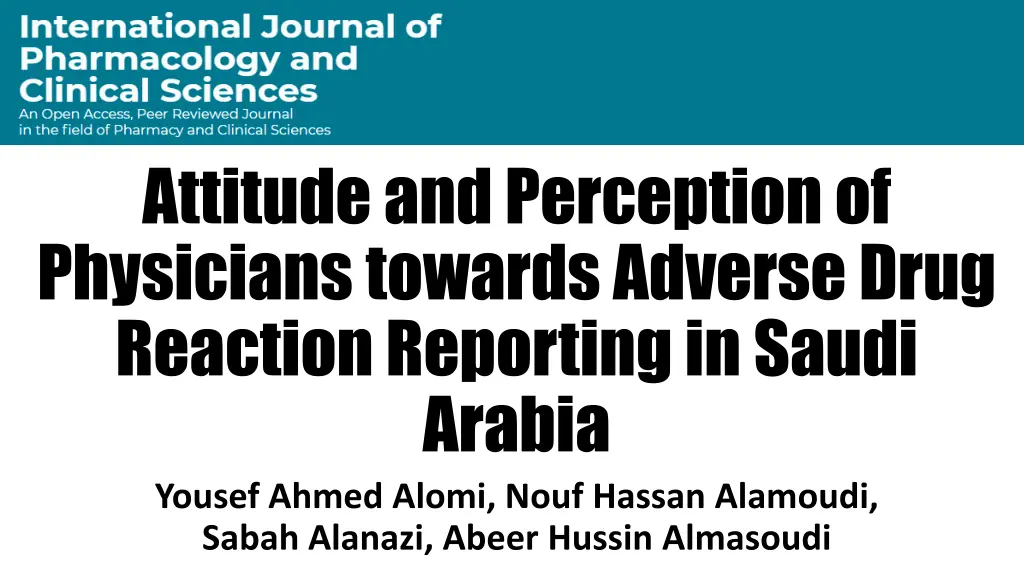
Physicians' Attitudes and Perceptions on Adverse Drug Reaction Reporting in Saudi Arabia
Explore the attitudes and perceptions of physicians in Saudi Arabia towards adverse drug reaction reporting. The study reveals positive perceptions and the need for training to enhance reporting systems and healthcare outcomes in the region.
Download Presentation

Please find below an Image/Link to download the presentation.
The content on the website is provided AS IS for your information and personal use only. It may not be sold, licensed, or shared on other websites without obtaining consent from the author. If you encounter any issues during the download, it is possible that the publisher has removed the file from their server.
You are allowed to download the files provided on this website for personal or commercial use, subject to the condition that they are used lawfully. All files are the property of their respective owners.
The content on the website is provided AS IS for your information and personal use only. It may not be sold, licensed, or shared on other websites without obtaining consent from the author.
E N D
Presentation Transcript
Attitude and Perception of Physicians towards Adverse Drug Reaction Reporting in Saudi Arabia Yousef Ahmed Alomi, Nouf Hassan Alamoudi, Sabah Alanazi, Abeer Hussin Almasoudi
ABSTRACT ABSTRACT: : Objective Objective: : Spontaneous reporting systems are indispensable as they aid perceive serious unknown adverse drug reaction (ADR). To assess the physician s perceptions and attitudes of adverse drug reaction reporting in the Kingdom of Saudi Arabia. Methods Methods: : It was a cross-sectional study with an authenticated survey distributed to different physicians and dentists in Saudi Arabia. A self-administered electronic survey involved of demographic data and perception of the ADR reporting system and factor facilitated or prevented reporting system.
ABSTRACT: ABSTRACT: Results Results: : The total number of participants was 151. Of those, 111 (73.5%) were physicians, while dentists were 39 (26.5%). The average score physician s perception about the prominence of the ADR reporting system was 4.46, with a statistically noteworthy difference within answers of each component (p<0.05). The average score of the physician s perception of factors that enabled the ADR reporting system was 4.13 with a statistically momentous difference within answers of each component (p<0.05). The average scores of perception physicians were 3.13, with a statistically significant difference between the responses of each facet (p<0.05). Conclusion Conclusion: : The physicians perception of ADR and related issues was optimistic. The physicians request periodic training of ADR identification and reporting program. The pharmacist plays a perilous responsibility to improve the ADR system with healthcare providers.
Key Words : Key Words : Physician, Attitude, Perception, Reporting, Adverse drug reaction, Saudi Arabia.
CONCLUSION: CONCLUSION: The current study was showed among physicians and dentists with an authenticated self-administered examination. The survey contained of several parts of perception of the ADR reporting system s aids, factors inspiring to report ADR and barriers discourage reporting of ADR with reviewed by expert reviewers & showed pilot study and usage of various reliability test. The study s results presented a positive attitude and perception of critical ADR reporting systems that contained of many previous studies. ADR s noteworthy concern barriers were education and training about ADR and related issues, while the physicians distressed with extrawork or high load prevents a report of ADR. The physicians displayed a positive arrogance toward pharmacists to be responsible for the ADR reporting system. The updating ADR of changing policy and procedures of responsibility from all healthcare providers to pharmacists and directing education and training measured is an essential solution to improve the insight of ADR in the Kingdom of Saudi Arabia.
